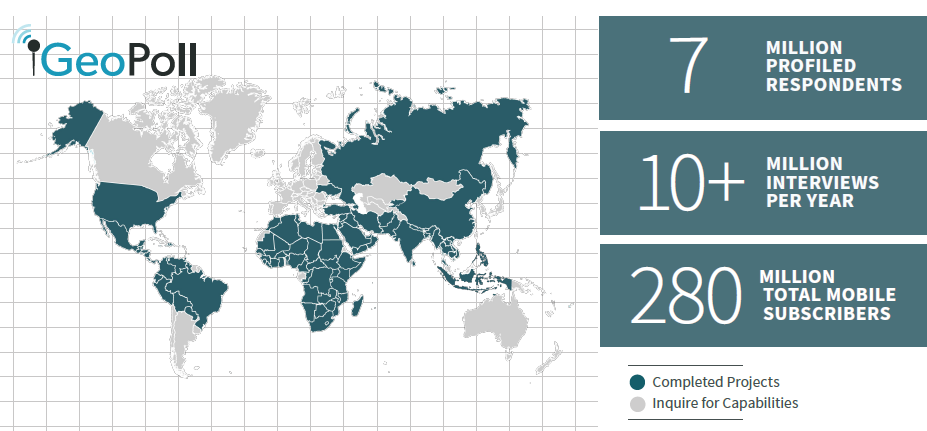On 3 April 1973, Marty Cooper made the first ever call from a New York street on a large “personal, handheld, portable cell phone”. On April 3rd, 2023, the world celebrated the 50th anniversary of that first mobile phone call, which marks a significant milestone in the history of telecommunications and how people communicate, work, and live their daily lives. From its humble beginnings as a bulky and expensive device used only by the wealthy and influential, the mobile phone has now become an essential tool used by billions of people worldwide. Today, mobile phone penetration rates are at an all-time high, with over 5 billion people worldwide owning a mobile phone, and over 3.8 billion owning a smartphone.
One of the areas where mobile phones have had a significant impact is in the field of market research. Mobile phones have revolutionized the way market research is conducted and made it easier and more affordable to reach a large number of people quickly and efficiently.
Since GeoPoll sent its first SMS survey to 4 million people in the DRC in September 2010, we have been at the forefront of using mobile phones for research, growing to be the leading provider of mobile-based research in Africa, Asia, and Latin America. The company uses a range of mobile-based research methods, including SMS, mobile web, phone calls (CATI), WhatsApp, and CAPI, which enable our clients and us to reach a wide range of respondents quickly and cost-effectively, regardless of their location. GeoPoll has conducted research in over 120 countries in areas where traditional methods of data collection are not always feasible.

The impact of the mobile phone on research
Mobile phones have had a huge impact on how research is done. Gone are the days of sending teams with pen and paper into the field and deploying scores of data entry staff to capture the paper data into computers. Mobile phones have also made it possible to conduct research in areas where it would have been difficult or impossible in the past, such as rural areas or developing countries. Here are some of the positive impacts that the mobile phone has had on research:
Real-time, remote data collection: Mobile phones have made it easier and more affordable to reach a large number of people quickly and efficiently. In GeoPoll’s case, a choice or combination of multiple survey modes, including SMS, mobile web, phone calls (CATI), WhatsApp, and CAPI, enable us to collect data in real time, which is particularly useful for tracking consumer trends and preferences, as well as tracking events such as elections or natural disasters.
More accuracy: Mobile phones have made it possible to collect data in a way that is more engaging and interactive than traditional methods, such as face-to-face interviews or paper surveys. The result is a higher response rate, more accurate data, and enhanced quality.
High-quality data: Mobile-based research methods enable researchers to collect high-quality data in a structured and standardized format. Mobile phones also make it possible to collect data to minimize respondent error, as respondents can be guided through the survey process without human interference, reducing bias and human error.
Large sample sizes: Mobile phones make it possible to reach a large number of people quickly and efficiently. In many countries, mobile penetration rates have surpassed 100% of the population, with smartphone uptake averaging about half of that. This enables researchers to collect data from a large sample size, improving the statistical power of their analysis and increasing the accuracy of their results. GeoPoll has access to close to 300 million respondents across the world.
Wider data offering: With the rise of smartphones, researchers now have access to a wealth of data, including geolocation data, which can be used to gain insights into consumer behavior and preferences.
Flexibility: Mobile research gives researchers choices. For example at GeoPoll, we easily shift from mode to mode. If, for example, SMS hits a snag, we can easily move to WhatsApp or phone calls without significant impact on timelines and cost. That’s how flexible and customizable the modes are to fit the needs of different research projects. For example, researchers can use SMS surveys for quick polls, or mobile web surveys for more in-depth data collection.

The future of mobile research looks bright.
The future of mobile-based research looks promising, as the use of mobile phones for data collection continues to grow. Here are some references and trends that suggest why mobile-based research will play an important role in the future:
Increased Smartphone Penetration: According to a report by GSMA Intelligence, the number of unique mobile subscribers worldwide is expected to reach 5.9 billion by 2025, with smartphone penetration reaching 80% globally by the same year. This means that more people will have access to mobile phones, enabling researchers to reach a wider audience for data collection.
Rise of Mobile-First Generation: The younger generation is increasingly mobile-first, with a significant proportion of them using mobile devices as their primary means of accessing the internet. As this generation becomes the primary consumers and decision-makers, mobile-based research will be essential in understanding their preferences and behavior.
Advancements in Technology: Mobile technology is advancing rapidly, with innovations such as 5G networks and AI-powered chatbots becoming more widely available. These advancements will enable researchers to collect more data in real-time, more engagingly and interactively, and will open up new data analysis and interpretation opportunities.
Increased Use of Mobile-based Research in Emerging Countries: Developing countries have been slower to adopt traditional research methods, such as face-to-face interviews or paper surveys. However, the widespread availability of mobile phones in these countries means that mobile-based research methods are increasingly being used to collect data. This will lead to a more comprehensive understanding of consumer behavior and preferences in these countries.
Growing Importance of Data Privacy: With the introduction of data privacy laws, such as GDPR and CCPA, researchers must ensure that their data collection methods comply with these regulations. Mobile-based research methods, such as SMS surveys, are often more transparent and secure than traditional methods, which will make them increasingly popular in the future.
Mobile-based research will become essential for understanding consumer behavior and preferences as mobile phones continue to play an increasingly important role in people’s lives. It’s a revolution that will increasingly be hard to ignore.
The final word
The 50th anniversary of the first mobile phone call is a significant milestone highlighting the impact of mobile phones on the world. The use of mobile phones for market research has been a key part of this impact, and GeoPoll has been at the forefront of using mobile phones for research. As mobile phones continue to evolve, we can expect to see even more innovative uses of mobile-based research in the future.
To learn about GeoPoll’s mobile research capabilities, please contact us.
